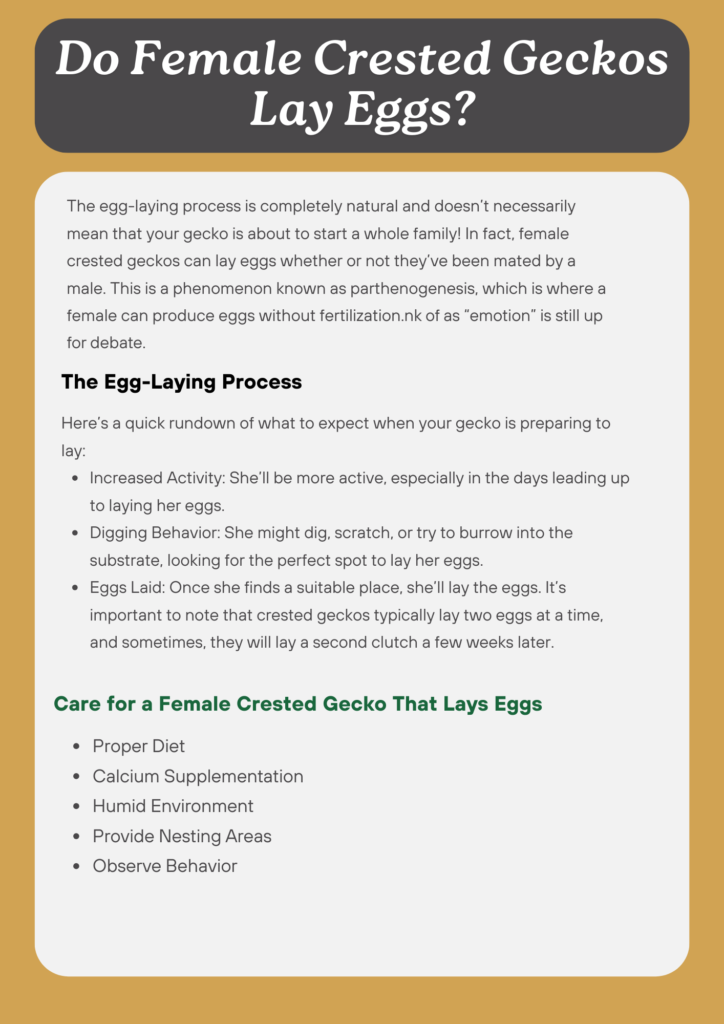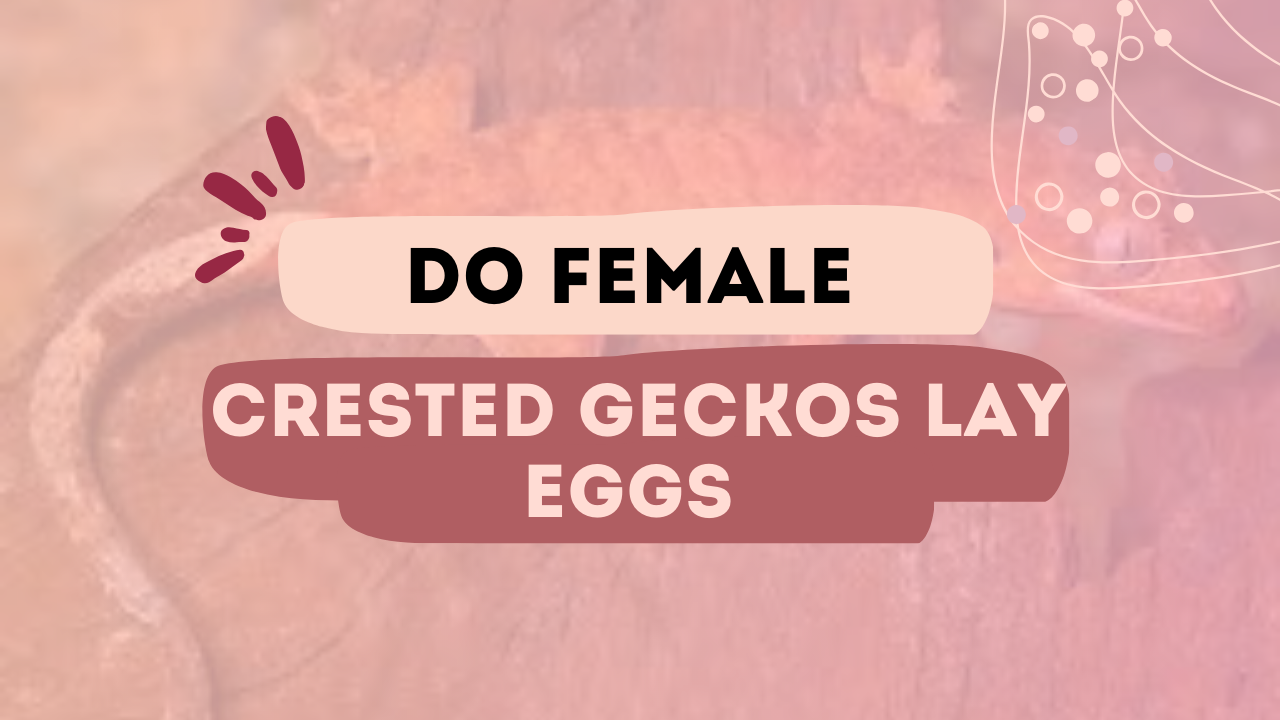If you’re new to owning these cute little creatures, you might be asking yourself, Do female crested geckos lay eggs? Well, don’t worry because the reason is that you’re not alone. A lot of new gecko owners are curious about this topic, especially because these reptiles are known to be egg-layers.
So, in this article, we’re going to dive into whether female crested geckos lay eggs, what that means for your pet, and how you can care for them through the egg-laying process. Whether you’re an experienced gecko owner or a beginner just getting started, we’ve got you covered!
Yes, Female Crested Geckos Lay Eggs
So, to get right to the point—yes, female crested geckos do lay eggs! But don’t freak out; the egg-laying process is completely natural and doesn’t necessarily mean that your gecko is about to start a whole family! In fact, female crested geckos can lay eggs whether or not they’ve been mated by a male. This is a phenomenon known as parthenogenesis, which is where a female can produce eggs without fertilization.
However, before you start imagining a whole nest of baby geckos running around, let me break it down for you. If your female gecko hasn’t been in contact with a male, the eggs won’t hatch, so there’s no need to worry about an unexpected gecko family popping up out of nowhere. The eggs will typically be infertile and, in some cases, may even be reabsorbed into her body, or just be laid and left behind.
The Egg-Laying Process
Now, let’s talk about the egg-laying process itself. It’s not always a quick affair. When your female crested gecko is ready to lay her eggs (which can happen when she’s about 18 months to 2 years old), you might notice her becoming a little more restless or digging around in her tank. This digging behavior is her way of preparing a place to lay the eggs, and it’s pretty instinctual. Crested geckos prefer to bury their eggs in a soft, moist substrate, so make sure her tank has a proper nesting area.
So, here’s a quick rundown of what to expect when your gecko is preparing to lay:
- Increased Activity: She’ll be more active, especially in the days leading up to laying her eggs.
- Digging Behavior: She might dig, scratch, or try to burrow into the substrate, looking for the perfect spot to lay her eggs.
- Eggs Laid: Once she finds a suitable place, she’ll lay the eggs. It’s important to note that crested geckos typically lay two eggs at a time, and sometimes, they will lay a second clutch a few weeks later.
Do You Need to Worry About the Eggs?
You might be wondering if you need to do anything special for the eggs. Well, the answer really depends on whether the eggs are fertile or not. If they’re infertile, there’s no need to worry about incubating them. You can just leave the eggs in the tank, and they’ll either be reabsorbed, rot, or dry out.
However, if the eggs are fertile and you’re interested in hatching them (say, you’ve got a male gecko in the mix), then you’ll need to provide the proper incubation conditions. Typically, crested gecko eggs need to be incubated at around 75-80°F (24-27°C) with high humidity to ensure proper development. You can use a small incubator or a DIY setup, like a container with moist sphagnum moss, to keep the eggs at the right temperature and humidity.
Important note: Even if your eggs are infertile, it’s still good practice to remove them from the tank after a couple of weeks, as they can start to smell or decompose, which is no fun for anyone.

How to Care for a Female Crested Gecko That Lays Eggs
If your female crested gecko is laying eggs regularly, there are a few things you’ll need to consider in her overall care. Egg production can take a toll on her body, so it’s important to make sure she’s in top condition. Here are some quick tips for taking care of your egg-laying gecko:
- Proper Diet: Make sure she’s eating a balanced diet that’s high in nutrition. You’ll want to feed her a variety of foods such as fruit purees, insects, and calcium supplements. Calcium is super important, as egg production can deplete her calcium stores.
- Calcium Supplementation: Speaking of calcium, it’s crucial to dust her food with a calcium supplement at least two to three times a week to keep her bones strong and healthy. Without enough calcium, your gecko can develop metabolic bone disease, which is really serious.
- Humid Environment: Like we mentioned earlier, the humidity in your gecko’s enclosure is key, especially when she’s laying eggs. This helps prevent dehydration, and it’s also a crucial factor for egg incubation if you plan to hatch them.
- Provide Nesting Areas: Make sure she has a suitable nesting area in her tank. Use a soft, moist substrate (like coconut fiber or sphagnum moss) for her to dig in and lay her eggs. This will make her feel more comfortable and encourage her to lay naturally.
- Observe Behavior: Keep an eye on her behavior and physical health. If you notice any signs of distress, unusual egg-laying behavior, or health concerns like swelling or a lack of appetite, you might need to consult with a vet who specializes in reptiles.
Should You Breed Your Crested Geckos?
Now, if you’re thinking about breeding your crested geckos, it’s important to note that breeding should only be done with a solid understanding of their care needs and the potential responsibilities that come with raising baby geckos. Not all crested geckos are suitable for breeding, and it’s essential to provide a proper environment for both the female and male gecko.
Breeding can also require additional effort, like providing a separate enclosure for the male and female, ensuring that the female has time to recover after laying eggs, and finding good homes for any baby geckos that are born. It’s a big commitment, so be sure you’re ready for the process!
Conclusion
So, to wrap up, yes—female crested geckos do lay eggs. It’s a natural part of their reproductive cycle, and it can happen with or without the presence of a male. Whether you’re caring for a solo female or thinking of breeding your geckos, it’s important to provide the proper care and attention to your pet’s health during the egg-laying process. Remember, female crested geckos are pretty low-maintenance when it comes to laying eggs, but ensuring they have the right conditions to thrive is key.

